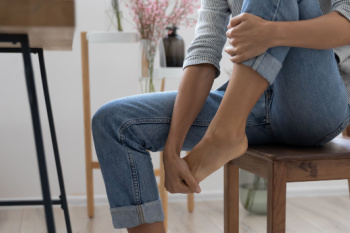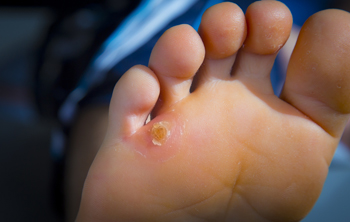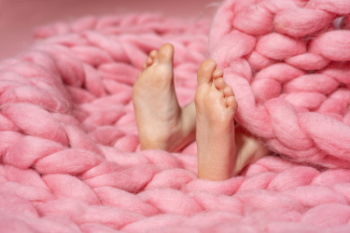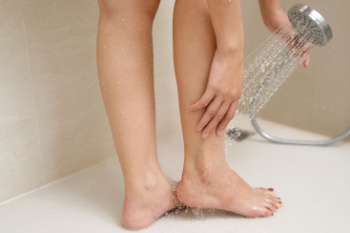Items filtered by date: September 2024
Are You Suffering From Ingrown Toenails?
What Can Cause Toe Pain?

Toe pain can stem from various conditions with distinct characteristics. Osteoarthritis, a degenerative joint disease, can cause pain and stiffness in the toe joints as cartilage wears away over time. Gout, a form of arthritis caused by uric acid crystals, often affects the big toe leading to sudden and intense pain, redness, and swelling. Turf toe, an injury common in athletes, results from hyperextension of the big toe and can cause pain and swelling at the base of the toe. Additionally, fractures, or broken toes, may occur from trauma or excessive stress, resulting in sharp pain, bruising, and difficulty moving the toe. If you have developed toe pain, it is suggested that you consult a podiatrist who can accurately diagnose the cause and provide the appropriate treatment solutions.
Toe pain can disrupt your daily activities. If you have any concerns, contact Philip Hahn, DPM of Advanced Foot & Ankle Center. Our doctor can provide the care you need to keep you pain-free and on your feet.
What Causes Toe Pain?
Most severe toe pain is caused due to a sports injury, trauma from dropping something heavy on the toe, or bumping into something rigid. Other problems can develop over time for various reasons.
Toe pain can be caused by one or more ailments. The most common include:
- Trauma
- Sports injury
- Wearing shoes that are too tight
- Arthritis
- Gout
- Corns and calluses
- Hammertoe
- Bunions
- Blisters
- Ingrown toenails
- Sprains
- Fractures (broken bones)
- Dislocations
When to See a Podiatrist
- Severe pain
- Persistent pain that lasts more than a week
- Signs of infection
- Continued swelling
- Pain that prevents walking
Diagnosis
In many cases the cause of toe pain is obvious, but in others, a podiatrist may want to use more advanced methods to determine the problem. These can range from simple visual inspections and sensation tests to X-rays and MRI scans. Prior medical history, family medical history, and any recent physical traumatic events will all be taken into consideration for a proper diagnosis.
Treatment
Treatments for toe pain and injuries vary and may include shoe inserts, padding, taping, medicines, injections, and in some cases, surgery. If you believe that you have broken a toe, please see a podiatrist as soon as possible.
If you have any questions please feel free to contact our office located in Texarkana, TX . We offer the newest diagnostic tools and technology to treat your foot and ankle needs.
How Are Foot Corns Treated?

Foot corns are thickened areas of skin that develop due to repeated friction or pressure, often from wearing ill-fitting shoes. They commonly appear on the toes or the soles of the feet and can cause discomfort or pain. Corns are categorized into hard corns, which form on bony areas, and soft corns, which develop between the toes where moisture softens the skin. They often result from wearing tight, narrow shoes or high heels that create pressure points. Proper diagnosis involves examining the corn, assessing footwear and walking patterns. Treatment typically includes wearing properly fitted shoes, using cushioning pads, and removing excess skin through professional care. If you have persistent corns, it is suggested that you consult a podiatrist for targeted treatment, as well as assessing the underlying cause of the friction to prevent recurrence.
If you have any concerns regarding your feet and ankles, contact Philip Hahn, DPM of Advanced Foot & Ankle Center. Our doctor will treat your foot and ankle needs.
Corns: What Are They? and How Do You Get Rid of Them?
Corns can be described as areas of the skin that have thickened to the point of becoming painful or irritating. They are often layers and layers of the skin that have become dry and rough, and are normally smaller than calluses.
Ways to Prevent Corns
There are many ways to get rid of painful corns such as wearing:
- Well-fitting socks
- Comfortable shoes that are not tight around your foot
- Shoes that offer support
Treating Corns
Treatment of corns involves removing the dead skin that has built up in the specific area of the foot. Consult with Our doctor to determine the best treatment option for your case of corns.
If you have any questions please feel free to contact our office located in Texarkana, TX . We offer the newest diagnostic and treatment technologies for all your foot and ankle needs.
Conservative Treatment for Congenital Foot Problems

Congenital foot problems are deformities or conditions present at birth that affect the structure and function of the feet. Common congenital foot issues include clubfoot, flat feet, and toe deformities such as overlapping or webbed toes. These conditions can range from mild to severe, impacting a child's ability to walk, balance, and engage in physical activities. Early detection is critical for effective management. Conservative treatments often begin with gentle manipulation and stretching exercises to improve foot alignment. For more structured support, custom orthotics or braces may be used to guide the foot into a more natural position as the child grows. Targeted exercises play a significant role in strengthening the muscles and improving mobility. In some cases, casting or splinting is recommended to gradually correct the deformity. While surgery is an option for more severe cases, many congenital foot problems can be managed conservatively, allowing children to develop healthy, functional feet as they grow. If your child is born with a foot condition, it is strongly suggested that you schedule an appointment with a podiatrist as quickly as possible to get treatment underway.
Congenital foot problems require immediate attention to avoid future complications. If you have any concerns, contact Philip Hahn, DPM of Advanced Foot & Ankle Center. Our doctor can provide the care you need to keep you pain-free and on your feet.
Congenital foot problems are deformities affecting the feet, toes, and/or ankles that children are born with. Some of these conditions have a genetic cause while others just happen. Some specific foot ailments that children may be born with include clubfeet, polydactyly/macrodactyly, and cleft foot. There are several other foot anomalies that can occur congenitally. What all of these conditions have in common is that a child may experience difficulty walking or performing everyday activities, as well as trouble finding footwear that fits their foot deformity. Some of these conditions are more serious than others. Consulting with a podiatrist as early as possible will help in properly diagnosing a child’s foot condition while getting the necessary treatment underway.
What are Causes of Congenital Foot Problem?
A congenital foot problem is one that happens to a child at birth. These conditions can be caused by a genetic predisposition, developmental or positional abnormalities during gestation, or with no known cause.
What are Symptoms of Congenital Foot Problems?
Symptoms vary by the congenital condition. Symptoms may consist of the following:
- Clubfoot, where tendons are shortened, bones are shaped differently, and the Achilles tendon is tight, causing the foot to point in and down. It is also possible for the soles of the feet to face each other.
- Polydactyly, which usually consists of a nubbin or small lump of tissue without a bone, a toe that is partially formed but has no joints, or an extra toe.
- Vertical talus, where the talus bone forms in the wrong position causing other bones in the foot to line up improperly, the front of the foot to point up, and the bottom of the foot to stiffen, with no arch, and to curve out.
- Tarsal coalition, when there is an abnormal connection of two or more bones in the foot leading to severe, rigid flatfoot.
- Cleft foot, where there are missing toes, a V-shaped cleft, and other anatomical differences.
- Macrodactyly, when the toes are abnormally large due to overgrowth of the underlying bone or soft tissue.
Treatment and Prevention
While there is nothing one can do to prevent congenital foot problems, raising awareness and receiving neonatal screenings are important. Early detection by taking your child to a podiatrist leads to the best outcome possible.
If you have any questions please feel free to contact our office located in Texarkana, TX . We offer the newest diagnostic tools and technology to treat your foot and ankle needs.
Essential Practices for Healthy Feet

Everyday foot care is vital for maintaining overall foot health and preventing common issues. Wearing comfortable, well-fitting shoes is important as they support and protect the feet from stress and injury. Regular walking helps maintain healthy circulation and keeps the feet flexible. Washing your feet daily with mild soap and water is important to remove dirt and sweat, reducing the risk of infections and unpleasant odors. Additionally, wearing clean socks made of breathable materials helps to keep feet dry and helps prevent fungal infections. Conditions that affect the feet, including foot odor, cracked skin, corns, and ingrown toenails, may be prevented by incorporating daily foot hygiene practices. If you have developed a foot condition, it is suggested that you consult a podiatrist who can treat various foot ailments and educate you on effective everyday foot care methods.
Everyday foot care is very important to prevent infection and other foot ailments. If you need your feet checked, contact Philip Hahn, DPM from Advanced Foot & Ankle Center. Our doctor can provide the care you need to keep you pain-free and on your feet.
Everyday Foot Care
Often, people take care of their bodies, face and hair more so than they do for their feet. But the feet are a very important aspect of our bodies, and one that we should pay more attention to. Without our feet, we would not be able to perform most daily tasks.
It is best to check your feet regularly to make sure there are no new bruises or cuts that you may not have noticed before. For dry feet, moisturizer can easily be a remedy and can be applied as often as necessary to the affected areas. Wearing shoes that fit well can also help you maintain good foot health, as well as making it easier to walk and do daily activities without the stress or pain of ill-fitting shoes, high heels, or even flip flops. Wearing clean socks with closed shoes is important to ensure that sweat and bacteria do not accumulate within the shoe. Clean socks help to prevent Athlete’s foot, fungi problems, bad odors, and can absorb sweat.
If you have any questions please feel free to contact our office located in Texarkana, TX . We offer the newest diagnostic and treatment technologies for all your foot and ankle needs.





